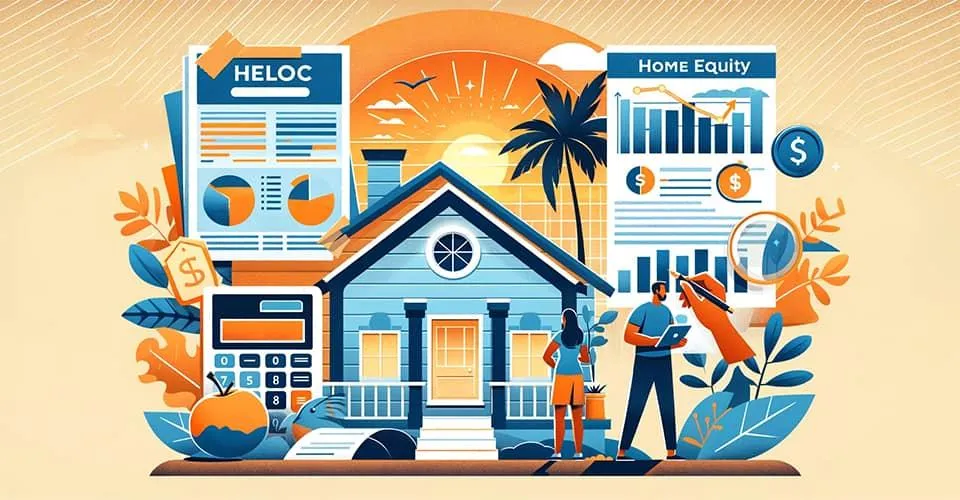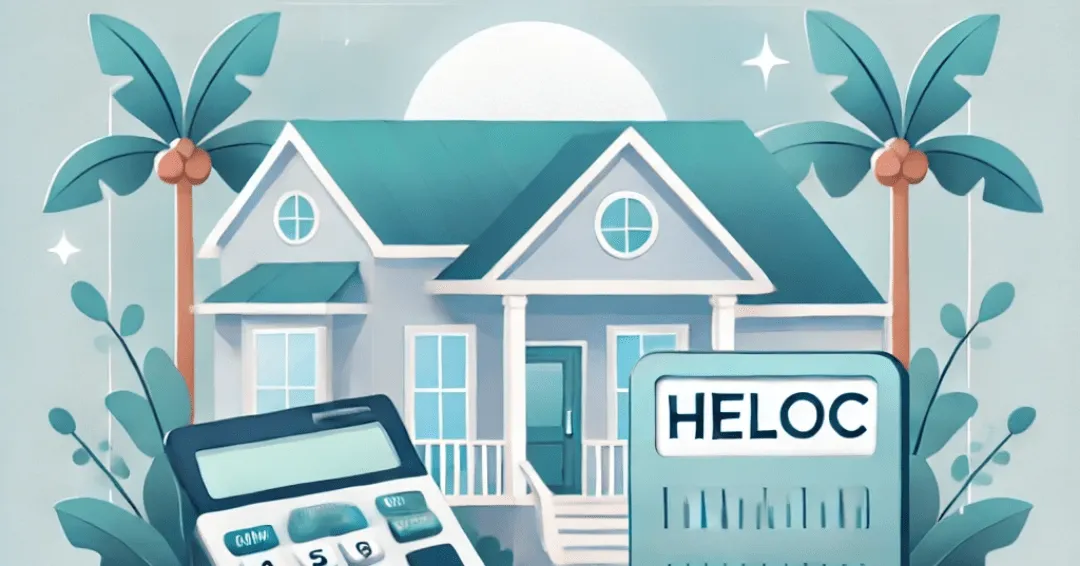Home Equity Line of Credit in Florida
Understand how Florida HELOC work, their pros & cons,
and how they compare to other loans. Explore eligibility,
costs & FAQs to see if a HELOC is right for you.

Living in Florida, you might consider tapping into your home's value for various needs. A Home Equity Line of Credit (HELOC) offers Florida homeowners a way to do just that.
Think of a HELOC as a flexible credit line secured by your home. You can borrow up to a certain limit, like a credit card, and only repay interest on the used amount.
This makes HELOC popular for:
• Home improvements: Upgrade your kitchen, bathroom, or add a pool.
• Debt consolidation: Combine high-interest debts into one lower-rate payment.
• Unexpected expenses: Cover emergencies, medical bills, or educational costs.
This guide explores the ins and outs of HELOC in Florida, helping you understand their potential benefits and key details.
How Does a Florida Home Equity Line of Credit Work?
In Florida, a Home Equity Line of Credit (HELOC) allows you to borrow against the equity you've built in your home.
This equity is the difference between your home's market value and the amount you still owe on your mortgage. Like other loans, a HELOC uses your home as collateral, which secures the loan.
Unlike traditional home equity loans that provide a lump sum upfront, HELOC function more like credit cards. You'll have a pre-approved credit limit you can draw from as needed and only pay interest on the amount you use.
As you repay what you borrow, your available credit line balance replenishes, allowing you to access funds again throughout the draw period.
Fill out our form below to get started on your affordable HELOC for free.
How to Qualify for a HELOC in Florida
Securing a HELOC in Florida requires meeting specific criteria set by lenders. Here's what you need to know:
Equity: You need sufficient equity in your home, typically at least 15% to 20% of its appraised value.
Credit Score: A good credit score (generally 640 or higher) increases your approval chances and potentially qualifies you for better interest rates.
Debt-to-Income Ratio (DTI): This ratio measures your monthly debt obligations compared to your gross income. A lower DTI (typically below 43%) indicates better financial stability and strengthens your application.
Stable Income: Consistent and verifiable income demonstrates your ability to repay the borrowed funds.
To improve your chances of qualifying for a HELOC, consider paying bills on time, maintaining low credit card balances, and exploring credit repair strategies if necessary.
Lowering your DTI by paying off existing debts and increasing your home equity through mortgage payments or renovations can strengthen your application.
Remember to gather necessary documents like tax returns, pay stubs, bank statements, and proof of homeownership.
Finally, compare different lenders and their HELOC offerings, including interest rates, fees, and terms, to find the best option.
These are general guidelines, and specific requirements may vary between lenders.
What Can HELOC Funds Be Used For?
A Florida HELOC offers a flexible funding option for various personal financial needs. Here are some common uses:
Home improvement projects: Upgrade your kitchen or bathroom or add a pool to increase your home's value and enjoyment. This can increase your home's market value, boosting your equity and improving your loan-to-value ratio.
Debt consolidation: Combine high-interest debts, like credit cards, into a single lower-rate HELOC payment. This can simplify your finances, save you on interest, and make managing your debt easier.
Unexpected expenses: Cover emergencies like car repairs, medical bills, or educational costs. HELOC can provide a safety net for unexpected situations without disrupting your regular budget.
Major life events: Finance weddings, college tuition, or starting a business venture. A HELOC can help you achieve long-term goals and invest in your future. Carefully considering your financial situation and repayment ability before using the funds for such purposes is crucial.
HELOC vs. Other Loan Options
Unlocking your home's equity can be achieved through different loan options, each with its advantages and drawbacks.
Let's compare HELOC to two popular alternatives:
Home Equity Loan
Both are secured by your home, offering potentially lower interest rates than unsecured loans.
A home equity loan is a fixed-sum loan, meaning you receive a lump sum upfront and repay it with fixed monthly payments over a set term.
HELOC offer greater flexibility as you can access funds as needed throughout the draw period and only repay interest on the amount used.
Personal Loan
Both can be used for various purposes. Personal loans are unsecured, meaning they aren't backed by collateral like your home.
This often translates to higher interest rates compared to HELOC. Personal loans typically have lower borrowing limits compared to HELOC.
Choosing the right option depends on your specific needs:
HELOC: Ideal for ongoing expenses or projects needing flexibility and potentially lower interest rates.
Home Equity Loan: Suitable for a one-time, fixed amount needed upfront, with predictable monthly payments.
Home Equity Loan: Suitable for a one-time, fixed amount needed upfront, with predictable monthly payments.
Cash-Out Refinance vs. Using a HELOC
Cash-out refinancing and HELOC are tools in Florida that allow homeowners to tap into their home equity for financial needs.
A cash-out refinance replaces your existing mortgage with a new, larger one. The difference between the new loan amount and your current mortgage balance is a lump sum.
Cash-out refinances typically offer lower fixed interest rates and longer repayment terms than HELOC, potentially reducing monthly payments. However, it's considered a new loan and can slightly impact your credit score.
On the other hand, a HELOC functions like a revolving line of credit, similar to a credit card. You have a pre-approved limit and can draw funds as needed during the draw period, only paying interest on the used amount.
HELOC typically have adjustable interest rates that fluctuate over time and shorter draw periods followed by a repayment period.
Compared to cash-out refinancing, they have a less significant impact on your credit score, especially if you use a small portion of the available credit.
Choosing between these options depends on your specific needs. A cash-out refinance might be ideal if you require a one-time, fixed sum for a specific project or debt consolidation. However, a HELOC might be the better choice if you need ongoing or flexible funding.
Frequently Asked Questions about Florida HELOC
HELOC can be a valuable financial tool for Florida homeowners, but navigating the process can raise questions.
Here are answers to some frequently asked questions to help you make informed decisions:
What are the pros of using a HELOC?
Flexibility: Access funds as needed throughout the draw period and only pay interest on the used amount.
Potentially lower interest rates: Compared to other loan options like personal loans.
Tax benefits: In some cases, the interest paid on a HELOC may be tax-deductible (consult a tax professional for specific information).
What are the cons of using a HELOC?
Secured by your home: If you default, you risk losing your home.
Variable interest rates: Rates can fluctuate, potentially increasing your monthly payments.
Temptation to overspend: Easy access to funds can lead to overspending, creating debt burdens.
Is a HELOC right for me?
A HELOC can be suitable for various needs, such as home renovations, debt consolidation, or unexpected expenses. However, it's crucial to consider your financial situation and risk tolerance.
If you have a good credit score, stable income, and a solid plan for using and repaying the funds, a HELOC might be a good option.
Consulting with a financial advisor can help you determine if it aligns with your financial goals.
How much does a HELOC cost?
The costs associated with a HELOC can vary depending on the lender, your creditworthiness, and the loan amount.
Typical costs include origination fees, appraisal fees, annual fees, and closing costs. Carefully compare different lenders and their fee structures before making a decision.
What are the eligibility requirements for a HELOC in Florida?
Generally, Florida lenders require:
Minimum equity in your home (typically 15-20%).
Good credit score (generally 640 or higher).
Stable income and employment history.
Verifiable income documentation.
Bottom Line
HELOC offer Florida homeowners a unique way to leverage their home equity and access funds for various needs.
Whether planning home improvements, consolidating debt, or addressing unexpected expenses, understanding the potential benefits and drawbacks is crucial for making informed financial decisions.
By exploring the different aspects covered in this guide, including how HELOC work, how they compare to other loan options, and the factors to consider for qualification, you can gain valuable knowledge and navigate the process more confidently.
Remember, consulting with a qualified financial advisor can provide personalized guidance and help determine if a HELOC aligns with your financial goals and risk tolerance.
Ready to explore the potential of a HELOC for your Florida home? Contact the experienced team at MakeFloridaYourHome to discuss your options and find the best solution for your needs.
Helpful Content



Find The Right Mortgage
For more than 20 years, Phil have been helping customers achieve
their home purchase and refinance goals by providing them with
invaluable resources and support.

Squeezed from Florida

Next Wave Mortgage, LLC | NMLS ID 2536820
Copyright © 2024 Make Florida Your Home. All Rights Reserved.
Quick Links
Next Wave Mortgage is not affiliated with any government agencies. These materials are not from VA, HUD or FHA, and were not approved by VA, HUD or FHA, or any other government agency.
Reverse mortgage borrowers are required to obtain an eligibility certificate by receiving counseling sessions with a HUD-approved agency. The youngest borrower must be at least 62 years old. Monthly reverse mortgage advances may affect eligibility for some other programs.
This is not an offer to enter into an agreement. Not all customers will qualify. Information, rates, and programs are subject to change without notice. All products are subject to credit and property approval. Other restrictions and limitations may apply.
Complaints may be directed to: [email protected]. For licensing information, please visit http://www.nmlsconsumeraccess.org


